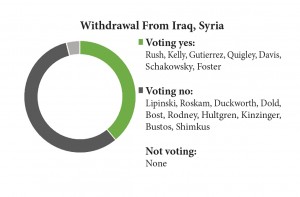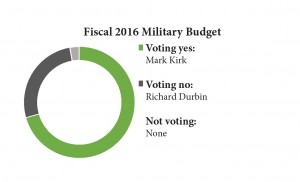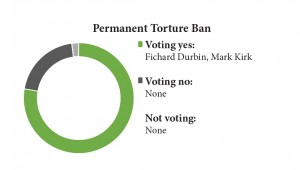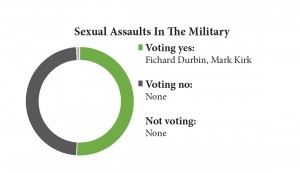How They Voted. Illinois Representatives’ Votes in Congress
Chronicle Media — June 23, 2015How They Voted. Illinois Representatives’ Votes in Congress
United States House of Representatives
 Trans-Pacific Trade Pact: Voting 218 for and 208 against, the House on June 18 passed a bill (HR 2146) that would enable trade agreements such as the 12-nation Trans-Pacific Partnership to move through Congress without amendments or filibusters. The bill gives President Obama fast-track Trade Promotion Authority for shepherding the TPP into law, and instructs U.S. officials to pursue GOP policy objectives on issues such as climate change and immigration as they negotiate the agreement. Whether the bill becomes law depends on other House and Senate trade votes expected soon.
Trans-Pacific Trade Pact: Voting 218 for and 208 against, the House on June 18 passed a bill (HR 2146) that would enable trade agreements such as the 12-nation Trans-Pacific Partnership to move through Congress without amendments or filibusters. The bill gives President Obama fast-track Trade Promotion Authority for shepherding the TPP into law, and instructs U.S. officials to pursue GOP policy objectives on issues such as climate change and immigration as they negotiate the agreement. Whether the bill becomes law depends on other House and Senate trade votes expected soon.
Mike Kelly, R-Pa., said: “Pass (this bill) today and put America back on the track to protect American jobs. Allow the economy to grow, and allow our workers not just to produce and distribute products at home, but around the world.”
Louise Slaughter, D-N.Y., said: “Preventing action on climate change. This is going to be written in this bill. Nobody anywhere can even bring up climate change. It is a great step backward.”
A yes vote approved fast-track rules for debating the Trans-Pacific Partnership when it arrives on Capitol Hill.
 Withdrawal From Iraq, Syria: Voting 139 for and 288 against, the House on June 17 defeated a measure (H Con Res. 55) requiring the U.S. military to withdraw from Iraq and Syria by year’s end unless Congress by then has authorized America’s war against the Islamic State in Iraq and Syria (ISIS). In the absence of updated congressional approval of U.S. combat abroad, the administration is using the 2001 Authorization for Use of Military Force (AUMF) and the 2002 Iraq war resolution as the legal underpinning of the current war.
Withdrawal From Iraq, Syria: Voting 139 for and 288 against, the House on June 17 defeated a measure (H Con Res. 55) requiring the U.S. military to withdraw from Iraq and Syria by year’s end unless Congress by then has authorized America’s war against the Islamic State in Iraq and Syria (ISIS). In the absence of updated congressional approval of U.S. combat abroad, the administration is using the 2001 Authorization for Use of Military Force (AUMF) and the 2002 Iraq war resolution as the legal underpinning of the current war.
Jim McGovern, D-Mass., said: “War is a big deal. We ought to treat it like it is a big deal. War has become too easy for this Congress.”
Michael McCaul, R-Texas, said that if the U.S. were to withdraw,”Iran and ISIS will…dominate in the region while thousands of innocent civilians suffer and die.”
A yes vote was to withdraw U.S. forces from the Middle East unless Congress authorizes their deployment.
 2016 Intelligence Budget: Voting 247 for and 178 against, the House on June 16 authorized a fiscal 2016 budget (HR 2596) estimated at $80 billion or more for the 16 U.S. civilian and military intelligence agencies. The actual figure is classified. The bill would authorize intelligence support for Ukraine, stiffen defenses against cyber crimes, expand space-based operations and further limit detainee transfers from the Guantanamo Bay, Cuba, military prison. In addition, the bill reportedly slashes CIA funding to train and equip rebel forces in Syria. The bill drew Democratic opposition over its shielding conventional intelligence spending in an emergency war account as a tactic to evade legally binding spending caps.
2016 Intelligence Budget: Voting 247 for and 178 against, the House on June 16 authorized a fiscal 2016 budget (HR 2596) estimated at $80 billion or more for the 16 U.S. civilian and military intelligence agencies. The actual figure is classified. The bill would authorize intelligence support for Ukraine, stiffen defenses against cyber crimes, expand space-based operations and further limit detainee transfers from the Guantanamo Bay, Cuba, military prison. In addition, the bill reportedly slashes CIA funding to train and equip rebel forces in Syria. The bill drew Democratic opposition over its shielding conventional intelligence spending in an emergency war account as a tactic to evade legally binding spending caps.
Robert Pittenger, R-N.C., said: “This is not the time to impede our intelligence efforts. America faces grave danger from those who wish to destroy our way of life.”
Adam Schiff, D-Calif., said Congress should repeal the blind spending cuts known as sequestration, “Not just employ accounting tricks to evade its levels only for defense and national security-related items.”
A yes vote was to send the bill to the Senate.
United States Senate
 Fiscal 2016 Military Budget: Voting 71 for and 25 against, the Senate on June 18 authorized a $612 billion military budget (HR 1735) for fiscal 2016, including $50.9 billion for U.S. combat abroad; more than $50 billion for active-duty and retiree healthcare; $3.8 billion for Afghan security forces; $600 million to boost Syrian opposition forces; $300 million in military aid to Ukraine and $75 million for securing the U.S. southern border. The bill sets a 1.3 percent pay raise for uniformed personnel and begins a 401(k)-style retirement plan for active and retired service members as an alternative to the military’s defined-benefit retirement plan. The bill was disputed over its shifting of $38 billion in conventional military spending to an uncapped emergency war account in order to evade statutory spending limits.
Fiscal 2016 Military Budget: Voting 71 for and 25 against, the Senate on June 18 authorized a $612 billion military budget (HR 1735) for fiscal 2016, including $50.9 billion for U.S. combat abroad; more than $50 billion for active-duty and retiree healthcare; $3.8 billion for Afghan security forces; $600 million to boost Syrian opposition forces; $300 million in military aid to Ukraine and $75 million for securing the U.S. southern border. The bill sets a 1.3 percent pay raise for uniformed personnel and begins a 401(k)-style retirement plan for active and retired service members as an alternative to the military’s defined-benefit retirement plan. The bill was disputed over its shifting of $38 billion in conventional military spending to an uncapped emergency war account in order to evade statutory spending limits.
John McCain, R-Ariz., said to Democrats objecting to the $38 billion funding shift: “With global threats rising, how does it make any sense to oppose a defense policy bill…for a reason that has nothing to do with national defense spending?”
Bill Nelson, D-Fla., said it was “budgetary fakery” for Republicans to transfer $38 billion in non-emergency spending to the wartime Overseas Contingency Operations (OCO) account.
A yes vote was to send the bill to conference with a similar House-passed measure.
 Permanent Torture Ban: Voting 78 for and 21 against, the Senate on June 16 amended the fiscal 2016 military budget (HR 1735, above) to permanently outlaw the use of torture by the U.S. government. The bill would put into law a 2009 executive order by President Obama that limits interrogation techniques to those specified in the U.S. Army Field Manual. It also would codify the order’s guarantee of International Committee of the Red Cross access to prisoners held by the U.S.
Permanent Torture Ban: Voting 78 for and 21 against, the Senate on June 16 amended the fiscal 2016 military budget (HR 1735, above) to permanently outlaw the use of torture by the U.S. government. The bill would put into law a 2009 executive order by President Obama that limits interrogation techniques to those specified in the U.S. Army Field Manual. It also would codify the order’s guarantee of International Committee of the Red Cross access to prisoners held by the U.S.
Dianne Feinstein, D-Calif., said: “Whatever one may think about the CIA’s former detention and interrogation program, we should all agree that there can be no turning back to the era of torture.”
No senator spoke against the amendment during floor debate.
A yes vote was to adopt the anti-torture amendment.
 Sexual Assaults In The Military: Voting 50 for and 49 against, the Senate on June 16 failed to reach 60 votes needed to advance an amendment to HR 1735 (above) that would transfer the military’s handling of sexual-assault cases from the chain of command to outside military prosecutors, who would determine whether to file charges.
Sexual Assaults In The Military: Voting 50 for and 49 against, the Senate on June 16 failed to reach 60 votes needed to advance an amendment to HR 1735 (above) that would transfer the military’s handling of sexual-assault cases from the chain of command to outside military prosecutors, who would determine whether to file charges.
Kirsten Gillibrand, D-N.Y., said: “No one should have to worry about retaliation from their chain of command when they report these crimes. Retaliation happens so often that a majority of these assaults go unreported.”
Claire McCaskill, D-Mo., said commanders “are being held accountable under rigorous new standards and oversight. Every victim who reports now gets their own independent lawyer to protect their rights and fight for their interests.”
A yes vote was to remove prosecutorial decisions on sexual assault from the chain of command.



